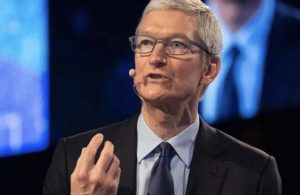As we all know, at its peak, Huawei held a dominant 56% market share in China. It outperformed Qualcomm in the chip market and frequently surpassed Apple to become the top player in the premium smartphone segment. Huawei was once considered the “pride of China.” However, after being hit with sanctions and falling into turmoil, Apple became the biggest beneficiary. Apple’s market share in China soared from a mere 8% during its low point to 20%, regaining its top position. Even combined, domestic brands like Xiaomi, OPPO, and Vivo struggled to compete with Apple in the high-end smartphone market.
But with Huawei out of the picture as a formidable competitor, Apple’s gains—record-breaking market value and sales growth—may just be a “bubble.” Earlier signs appeared with the iPhone 12, as Apple adopted a “squeezing the toothpaste” approach to innovation. The company’s increasingly arrogant attitude toward users also raised eyebrows. For instance, an Apple executive once infamously told fans, “If you don’t like the iPhone, switch to Android!”—a statement brimming with hubris.

To maximize profits, Apple has long relied on outdated technology like the 5W charging adapter and the proprietary Lightning port. Under the guise of “environmental protection,” Apple stopped including chargers with its phones, sparking widespread criticism. This penny-pinching strategy earned Apple the label of a “greedy merchant.” As the saying goes, pride comes before the fall. Apple’s arrogance eventually led to consequences. In 2022, the Dutch government fined Apple €5 million weekly for alleged ecological monopolistic practices. In Brazil, the government ordered the closure of Apple’s stores over its refusal to include chargers and warned that iPhones must be sold with chargers or they would be banned.
The European Union also cracked down on Apple’s use of the outdated Lightning connector, issuing two warnings: future iPhones must adopt USB-C ports or face being banned from the European market. Reluctantly, Apple complied, introducing USB-C in the iPhone 15 series. But Tim Cook never expected sanctions to hit again so quickly. Just as the company transitioned to USB-C, the EU took further action.
According to reports from China Central Television (CCTV), on November 22, the European Commission issued a statement saying it would continue to monitor tech companies, including Apple, under the Digital Markets Act and competition rules. Back in March, Apple had already been warned by the EU for anti-competitive behavior, specifically for not allowing streaming platforms like Spotify to offer third-party payment options. The EU demanded that Apple provide developers with clear pathways to redirect users outside of its App Store or face penalties.
Now, it seems the EU is following through with those threats. Apple has been hit with a €1.84 billion fine ($13.9 billion USD). Reports suggest that Tim Cook even called former President Trump for assistance, indicating the fine is almost certain to stand.
In fact, similar issues have arisen in China. Recently, a widely publicized dispute between Apple and WeChat highlighted the company’s restrictive practices. However, the two parties appeared to have reached a compromise.
In conclusion, Apple under Tim Cook is no longer the visionary company led by Steve Jobs. Cook’s laser focus on profits has come at the expense of user satisfaction and market needs, creating a growing disconnect with customers. Now that Huawei is making a strong comeback and brands like Xiaomi are rising rapidly, Apple’s current trajectory could lead to losing the Chinese market entirely. If that happens, the trillion-dollar empire it built may crumble overnight.
Let’s hope Cook realizes this in time and shifts his focus back to meeting customer needs. If you agree, share your thoughts!